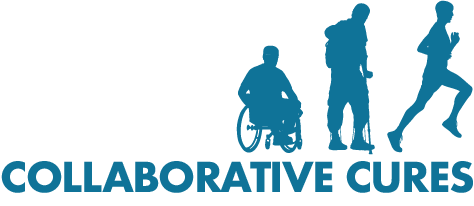Paralysis strikes at the very heart of what it means to be human.
It’s not just the lack of feeling and movement, it also interferes with the body’s internal systems that are designed to keep people alive. Multiple infections, neuropathic pain and uncontrollable spasms are common. These are the things that exhaust even the most determined. And, along with fundamentally impacting quality of life, it comes with €4 million average lifetime cost of care, there are huge barriers to getting back to work, and premature death is inevitable.
Everything we do at Collaborative Cures is about bringing people together to cure paralysis in our lifetime. We’re focused on creating a public benefit for up to 60 million people around the world who suffer from some form of paralysis.
Strategy
Many of the world’s greatest scientists and technologists have discovered breakthroughs that have the potential to impact paralysed people’s lives today. Yet, these interventions are held hostage in the minds and labs of these spectacular researchers due to systemic failures in translating research from the lab to the clinic.
Furthermore, no individual scientist, technologist, entrepreneur, investor or philanthropist is going to cure paralysis on their own. But by working together, they will.
Through Collaborative Cures, we’re focused on creating systemic impact that will:
- Reduce 50-year scientific translation timelines to 10 years by creating the conditions for collaboration, facilitating healthy rivalries and building trust.
- Catalyse collaborations worth $1 billion by connecting scientists and technologists with business know how, regulatory expertise and capital.
Delivering Outcomes
Our strategy is designed to bring people together to cure paralysis in our lifetime. To do it, our plan focuses on the following outcomes:

Insights
Co-creating research insights with an interdisciplinary knowledge network of leadership experts, negotiation practitioners, performance psychologists and behavioural scientists to understand how to tackle systematic fragmentation while exploring the intersection where humans and technology collide to test experimental therapies.

Inspire
Generating engagement with decision makers on the global stage and sharing insights about creating the conditions for collaboration, facilitating healthy rivalries and building trust.

Integrate
Systematically identifying, mapping and building relationships with leading scientists, technologists, entrepreneurs, investors, philanthropists and regulators around the world to integrate their work and catalyse collaborations worth €1 billion to cure paralysis in our lifetime.
